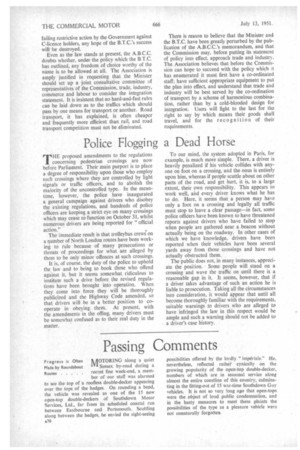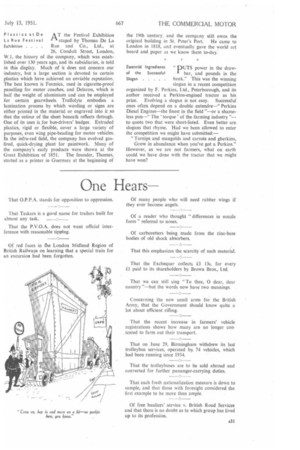Passing Comments
Page 32

Page 33

If you've noticed an error in this article please click here to report it so we can fix it.
Progress is Often NAOTORMIG along a quiet Made by Roundabout "I Sussex by-road during a Routes recznt fine week-end, a mem ber of our staff was alarmed to see the top of a roofless double-decker appearing over the tops of the hedges. On rounding a bend, the vehicle was revealed as one of the 15 new open-top double-deckers of Southdown Motor Services, Ltd., far from its scheduled coastal run between Eastbourne and Portsmouth. Scuttling along between the hedges, he envied the sight-seeing 00 possibilities offered by the lordly " imperiale." He, nevertheless, reflected rathe? cynically on the growing popularity of the open-top double-decker, numbers of which are in seasonal service along almost the entire coastline of this country, culminating in the fitting-out of 15 war-time Southdown Guy vehicles. It is not so very long ago that open-tops were the object of loud public condemnation, and in the hasty measures to meet these plaints the possibilities of the type as a pleasure vehicle were not unnaturally forgotten.
Plastics at De AT the Festival Exhibition La Rue Festival " staged by Thomas De La Exhibition . Rue and Co., Ltd., at 26, Conduit Street, London, W.1, the history of the company, which was established over 130 years ago, and its subsidiaries, is told in this display. Much of it does not concern our industry, but a large section is devoted to certain plastics which have achieved an enviable reputation. The best known is Formica, used in cigarette-proof panelling for motor coaches, and Dclaron, which is half the weight of aluminium and can be employed for certain gearwheels. Traffolyte embodies a lamination process by which wording or signs are either printed in the material or engraved into it so that the colour of the sheet beneath reflects through. One of its uses is for bus-drivers' badges. Extruded plastics, rigid or flexible, cover a large variety of purposes, even wing pipe-beading for motor vehicles. In the infra-red field, the company has evolved gasfired, quick-drying plant for paintwork. Many of the company's early products were shown at the Great Exhibition of 1851. The founder, Thomas, started as a printer in Guernsey at the beginning of
the 19th century. and the company still owns the
original building in St. Peter's Port. He came to London in 1818, and eventually gave the world art board and paper as we know them to-day.
Essential Ingredients
RUTS power in the draw of the Successful I bar, and pounds in the Slogan bank." This was the winning
slogan in a recent competition organized by F. Perkins, Ltd., Peterborough, and its author received a Perkins-engined tractor as his prize. Evolving a slogan is not easy. Successful ones often depend on a double entendre—" Perkins Diesel Engines—the finest in the field "—or a shameless pun—" The torque' of the farming industry "— to quote two that were short-listed. Even better are slogans that rhyme. Had we been allowed to enter the competition we might have submitted:— " Turnips and mangolds and carrots and gherkins, Grow in abundance when you've got a Perkins." However, as we are not farmers, what on earth could we have done with the tractor that we might have won?




























































































